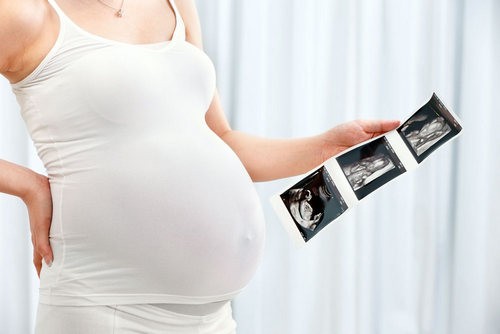Many future mothers have a stony stomach at 39 weeks. Why is this happening? Some women think that childbirth is already beginning, others worry that something bad is happening with the baby.
The answer in most situations is simple – these are training fights.
At one point, the abdomen becomes stiff, becomes hard, the lower back seems to be covered by a tight ring, during pregnancy at a period of 40 weeks this can happen several times a day, so many primiparas are frightened and do not know what it is and when it is necessary to go to the doctor.
What happens in the mother’s body
Some changes are constantly taking place in the mother’s body. If in the early stages there is a formation of conditions for the growth and development of the fetus, then in the third trimester the female body begins to gradually prepare for birth.
Beginning from the 39th week of pregnancy, almost everyone has a stony stomach – what is it for – future mothers begin to guess, and when will the most important and long-awaited meeting with the baby occur?

Changes at 39 weeks of gestation
After 36 weeks, the pregnancy is considered full-term, but most women give birth between 38 and 41 weeks. If the stomach is stiff at 39 weeks , such a sign is a signal of the body’s readiness for the birth of a child, however, childbirth does not always happen on this day.
Often in pregnant women in the late stages, training contractions are observed, in which:
- muscle spasm occurs and the stomach becomes hard;
- pulls the lower back;
- there is a pulling pain that girdles the abdomen.
A distinctive feature of training fights from true can be considered the absence of periodicity of contractions, the intensity of attacks does not increase, fights are short in time.
When the stomach often stiffens for a period of 39 weeks, it is necessary to monitor the contractions, to note the time interval when they are repeated, as well as the duration of each period. Depending on the data received, you should decide whether to stay at home or go to the hospital.
At 40 weeks
At the onset of 40 weeks, you can expect that childbirth will begin at any time, so you do not need to ignore the condition when the stomach is stony or the lower back hurts. At this time, the female reproductive system is being actively prepared for the birth of the baby: the cervix becomes more elastic, it is shortened and becomes smoother.
At 40 weeks of gestation, mucus plugs may occur, which indicates the imminent onset of labor – they usually occur within a week, while the pregnant woman develops red-brown mucous secretions, the stomach often stiffens, and pulling discomfort in the lower abdomen occurs.
Why does my stomach turn stiff at 40 weeks? This is due to false contractions. Thus, the body seems to check whether it is ready for such a complex and lengthy process as childbirth. If a woman expects the birth of her first child, then such fights are often accompanied by anxiety or fear, because she does not know what will happen next. If this is the second pregnancy, then the mother already knows the whole sequence of the process and tries to remain calm.

At 41 weeks
If 41 weeks of pregnancy have already begun, and the long-awaited meeting with the baby still does not happen, although the future mother often has a stony stomach, you should not worry. After all, an infant is considered to be postponed only after 42 weeks.
Mistakes in calculating the gestational age often occur. The obstetric and physiological periods can differ by 2 weeks, since it is not always possible to accurately determine the day when the conception occurred.
Pregnancy during this period is accompanied by the following phenomena:
- sometimes the lower abdomen hurts, which may be accompanied by hardening;
- discomfort in the perineum, as well as in the hip joints;
- mood swings;
- cork detachment, if this has not happened before.
Possible complaints and problems
At the final stage of pregnancy, starting from 39 weeks, the expectant mothers have a stony stomach, and this happens often.
In this case, the woman indicates various symptoms and uncomfortable conditions :
- Due to the fact that the uterus is greatly enlarged, it presses on the large intestine, which causes constipation and flatulence.
- Since the release of bile from the gallbladder is impaired, the pregnant woman indicates severity in the projection of the right hypochondrium. It does not hurt, but there is pressure in this area.
- In the last weeks of pregnancy, especially at 39-41, the expectant mother often has a stony stomach, which occurs due to hypertonicity of the uterine muscles.
- The growing fetus presses on the perineum and leads to the expansion of the pelvic bones, which causes pain in the projection of the pubic symphysis.
- Due to excessive overstretching of the skin, their dryness occurs, striae are often formed.
If your stomach stiffens during pregnancy at 40 weeks, you should not worry about this. Your body is already ready for the birth of a child, so this exciting event will happen very soon.

Why is my stomach stony?
As a rule, unusual sensations in the abdomen appear when a woman soon has to give birth. This is the main sign indicating the imminent birth of the baby, especially if the stomach is stiff and sore at 40 weeks of gestation.
It should be noted that not only at the 39th and 40th week of pregnancy, the abdomen turns to stone – this can happen in any period of gestation. Why it happens?
There are several reasons:
- Hypertonicity. The uterus consists of smooth muscle fibers, which tend to contract, resulting in a feeling of tension in the abdomen. This condition can occur with overwork, stress, sometimes women indicate that hypertonicity occurs after obstetric examination.
- Fights Brexton Hicks. When the expectant mother is expecting her first child, she can be scared if her stomach is stony at the 40th week of pregnancy and it is not clear what it is. Training fights prepare the uterus and the entire body for a complex and lengthy process.
A pregnant woman at the end of the last trimester needs to listen to the signals that her body gives. If the lower abdomen pulls, and it turns to stone at 40 weeks, it is necessary to note the beginning and end of contractions, as well as the duration of the intervals between them. If the pain appears every 10 minutes, you must urgently go to the hospital.
How to relieve discomfort?
From the moment the pregnant woman begins to periodically feel the training contractions and her stomach turns stiff at the 39th week of pregnancy, the expectant mother begins to worry about the main question – when is the birth? Unfortunately, not a single doctor will give an exact answer, but it should be understood that the expectant mother goes to the finish line – an exciting event can occur on any day.
When the stomach often stiffens at 40 weeks, while the birth does not begin, you can reduce the discomfort in the following ways :
- when a false fight occurs, it is necessary to lie down and rest;
- to ease the feeling of a stone stomach, you need to stand on all fours and bend your back down, and then round it;
- with severe pain, it is allowed to take a No-shpa pill, which will relieve muscle spasm;
- you can not lie on your back for a long time and in the same position;
- you can not lift weights and overexert.
In what cases do I urgently need to see a doctor?
There are situations when it is necessary to urgently seek medical help.
This is best done for those who have a stony stomach during 40 weeks of pregnancy, and the following symptoms are determined :
- bleeding;
- water discharge;
- sudden hyperthermia;
- dizziness with subsequent loss of consciousness;
- there are no signs of baby stirring;
- regular contractions with a break of 5-10 minutes.
Why does the stomach turn stiff at the 40th week of pregnancy? Such a sign indicates that everything is already ready for the birth of a child, and it remains only to wait for this meeting. When fighting, try not to be nervous, think that soon you will see your baby for the first time.



